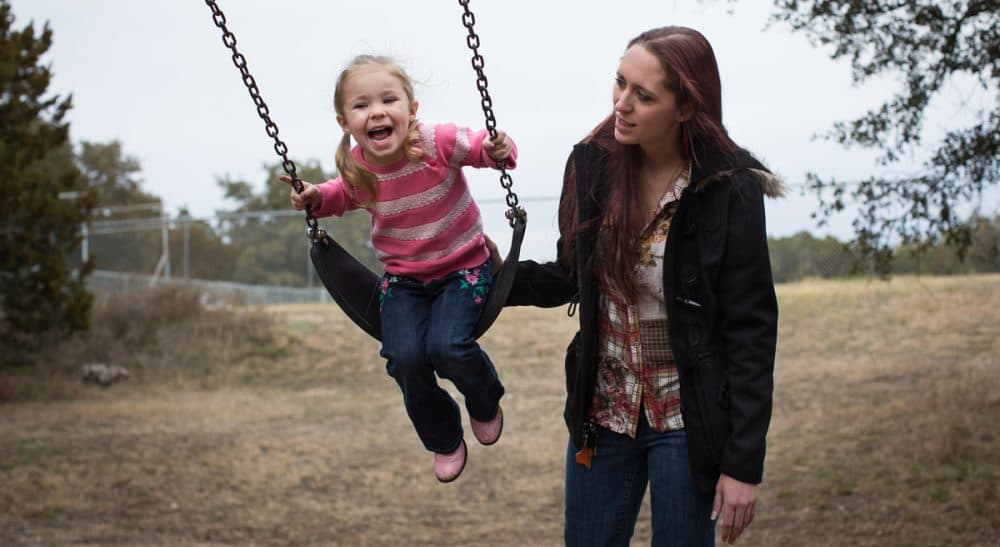Advertisement
It’s Hard To 'Lean In' When You’re Working For Minimum Wage

As a 14-year-old in 1968, I watched news broadcasters ridicule a group of feminist women who had picketed the Miss America pageant. I was delighted by the protest, but unsettled by the sneering condescension of those reporting on it. “Pretty girls don’t have those problems,” pageant host Bob Hope said of the demonstrators.
I’d largely forgotten about those nascent days of the modern feminist movement until very recently. First I heard Mike Huckabee’s shabby, upside-down assertion that women’s right to contraception under the Affordable Care Act is a form of government-imposed (excuse me — “Uncle Sugar” — imposed) helplessness. Then I heard the predictable but still astonishing objections to President Obama’s call for a higher minimum wage as governmental repression of initiative and hard work.
["Lean In"] is essentially a book about how women can find and retain their place in the 1 percent.
I don’t know — perhaps paternalism disguised as respect is coming back into vogue. But I do know that unless men and women alike refuse to settle for almost equal and challenge the mantra that government has no role to play in assuring justice, my two granddaughters (and they are “pretty girls”) are in for big problems.
In "Lean In" (which may be the most highly promoted and read book about feminism since "The Feminine Mystique"), Sheryl Sandberg argues for women to be professionally ambitious. As a senior vice president of a company with a female CEO and a predominantly female leadership team, I know that my circumstances would have been barely imaginable 30 years ago. But nonetheless, I find myself unmoved by "Lean In." Being a working mom without paid help is damn hard, yet the word “stamina” doesn’t appear in the text. Neither does “resilient,” or “durable.” But “power?” Twenty-nine times. “Leadership?” Fifty-two.
Sandberg would argue that female executives can more effectively mentor other working women. Maybe, but they won’t keep their jobs unless they make profits comparable to those delivered by their male counterparts, and in many industries, the default way to do so is by woefully underpaying workers, regardless of gender. So though I don’t question Sandberg’s sincerity, I can’t overcome my discomfort with what she herself concedes is essentially a book about how women can find and retain their place in the 1 percent.
And those in the 99 percent? I’ve been meeting a lot of them lately — mostly Haitian, Brazilian, and Jamaican women — as I interview home health aides for my mother. I see more and more of them in her independent living facility, where old white women and men are wheeled or led by the hand by younger women of color. They wipe traces of dinner off the residents’ faces, put on their clients’ shoes with the same supplicatory competence that they show their own children. Some show the infantilized elderly the same sort of affection, too, placing a comforting arm around their shoulders or gracing their papery cheeks with warm kisses.
unless men and women alike refuse to settle for almost equal and challenge the mantra that government has no role to play in assuring justice, my two granddaughters are in for big problems.
They are in the business of care-giving, these women, sharing leads and shifts among themselves, their in-laws, and their non-English-speaking mothers. And though they are leaning in as far as their tired frames and beat up cars will take them, there are no nannies or corporate jets in their futures. Their confidence or willingness to be outspoken, their husbands’ readiness to be equal partners — none of this matters much as long as they’re still living hand to mouth, scrambling for day care and housing, taking $2 less an hour for cash payments rather than checks. They are just the latest wave of immigrants to do the work that we value so much and pay so little for.
Thanks to the stuttering progress of the feminist movement, “legal” women workers now earn 77 cents for every dollar earned by men, as opposed to the 59 cents that was the going rate when I attended my first women’s liberation conference over 40 years ago. Lesbians are less closeted and more accepted by society, and abortion is legal (if increasingly threatened). The feminist movement opened some doors and reduced some risks for women seeking to express and manage the implications of their own sexuality (though not if Mike Huckabee has his way).
But the work of bathing and cleaning, of making the food and sewing the clothes, of shepherding the old people and teaching the children? This remains largely women’s work — essential, underpaid, and profound in its impact. And rectifying that inequality? That’s everyone’s job.
Related:
- Amy Gutman: Why Feminists Don’t Get Drunk
- Sarah Sobieraj: Why Doesn’t Katy Perry Want To Be Called A Feminist?
- Carey Goldberg: Sheryl Sandberg's Biggest Blind Spot
